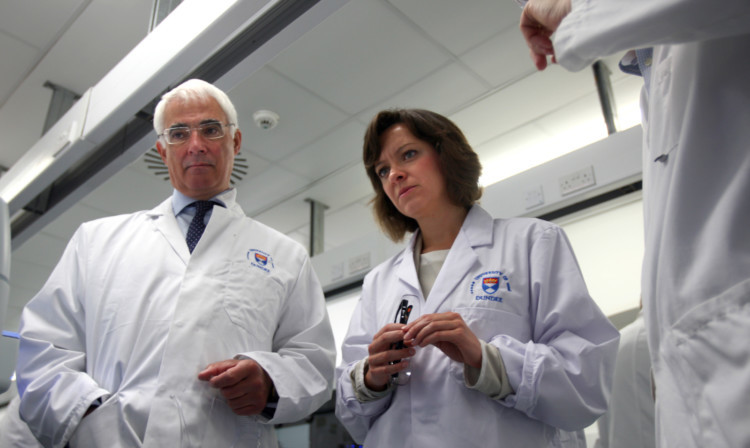Dundee and St Andrews universities’ research funding would be “devastated” by an independent Scotland being unable to charge tuition fees to UK students, Alistair Darling has claimed.
His comments came as a report by Edinburgh University said that, presuming the country was within the EU after a Yes vote, it could no longer charge English, Welsh and Northern Irish to study here.
Currently, students from the rest of the UK have to pay tuition fees but EU students do not. The Scottish Government wants to continue this policy in the event of independence but it has been said to break European competition rules.
Speaking to The Courier after touring Dundee University’s life sciences department, Mr Darling said: “This report confirms what countless experts, including senior EU officials, have said, which is that the nationalists’ tuition fees plan would be illegal. The potential loss of £150 million a year in funding would be a blow to universities right across Scotland.
“If Scottish universities were to lose this income it would devastate their ability to teach and carry out world class research. It would be bad for students, medical research and Scotland’s reputation.
“The nationalists’ arguments have been torn to shreds. They have no credibility on this and they are jeopardising the chances of thousands of students as well as Scotland’s reputation.”
Discriminating on the grounds of nationality is expressly forbidden under the Treaty on the Functioning of the European Union. The report concluded charging rest of UK students “flies in the face of what we’re required to do as good Europeans”.
The analysis featured 50 higher education professionals and 150 young people. It claimed that concern about so-called “fee refugees”, a term dubbed by Education Secretary Mike Russell to describe an influx of students from England choosing free education in Scotland to avoid being charged at home, is unfounded.
A Scottish Government spokeswoman said: “The Scottish Government is firmly committed to free tuition and we need to ensure that there are enough funded places for Scottish domiciled students. This is important for them, their families and the economy.
“In 2012/13, 1.5% of English-domiciled full-time first degree students studied in Scottish higher education institutions, but these students accounted for 10.7% of full-time first degree students at these institutions. Even a limited increase in the proportion of students from England could have a significant impact on access to places for Scottish-domiciled students.
“The ability to benefit from free tuition would provide a very strong incentive for students being asked to pay up to £27,000 over three years to come to Scotland in increased numbers. That is why our policy on this matter is in place.
“If the UK Government was to reconsider its policy on charging tuition fees, of course the Scottish Government would reconsider in light of any changes.”
